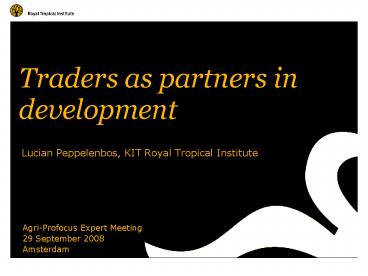Traders as partners in development PowerPoint PPT Presentation
1 / 21
Title: Traders as partners in development
1
Traders as partners in development
- Lucian Peppelenbos, KIT Royal Tropical Institute
Agri-Profocus Expert Meeting 29 September
2008 Amsterdam
2
Trading Up building cooperation between farmers
and traders in Africa
3
The issue at stake
- Smallholder farmers in Africa face serious
difficulties selling their farm products - But the people who specialize in marketing these
products are treated with great suspicion - Popular opinion holds that traders are redundant
and manipulative, hence their needs are
neglected
This results in distrust, inefficient food
chains, adverse policies, and disappointing
outcomes for farmers, traders and consumers alike
4
The challenge
- We believe that traders can be partners in
development - More support to traders would enable them to find
more customers, add value to products, invest in
new businesses, increase efficiency in food
distribution, improve their services to farmers,
etc.
This creates demand for more and better farm
products, thus helping to improve incomes and
livelihoods on the countryside
5
Agricultural markets in Africa
- Long, fragmented supply chains long distances
and many steps between producer and consumer
- Volatile prices
- Weak rural infrastructure
- Lack of market information
- Few grades and standards
- Lack of financial services
- Weak court systems
- Little policy support
- Weak business organization
- Little value addition
- Etcetera
6
The trader
Despite the harsh environment, traders manage to
get daily fresh products to consumers in the
city. The book provides real-life stories of
traders
- Their roles in the food chain
- Services to farmers and customers
- Costs and risks in trading
- How traders are organized
- Relationships with farmers
- Problems and needs
- Strategies and proposals
7
Different types of traders
- Traveling traders
- Resident traders
- Wholesalers
- Retailers
- Hawkers
- Brokers
- Exporters/importers
- Each has a specific role and services in the
chain, though some may become redundant when
farmers organize. While some (wholesalers) are
rich, most traders are poor!
8
Social networks in trading
- Interpersonal relationships are a key asset in
trading they reduce costs and risks
- Secure supply base / market outlet
- Credit flows in both directions
- Information on supply, demand, prices
- Reduced risk of default
Hence traders tend to build long-term relations
with farmers, and organize with peers in
(informal) trader associations
9
What is a fair profit margin for traders?
- High costs
- Transport (40-60)
- Handling (20-30)
- Search (15-20)
- Taxes and fees (10-15)
- Product losses (5-25)
- (No finance / storage costs)
- High risks
- Price fluctuations
- Cheating and default
- Product wastage
- Thefts
- Lack of supply
- (No insurance!)
10
What is a fair profit margin for traders?
- Excessive profits are unsustainable they are a
market opportunity for others - Only cases of lasting exploitation where
governments interfere (e.g. fertilizer Zimbabwe,
coffee Tanzania)
- Profit margins in trading vary per marketplace,
per commodity, per season - Profit margins of traders should be interpreted
in the light of costs, risks, and services
Value shares in the chain
11
What are good traders?
- In any business sector there are bona fide and
mala fide entrepreneurs (also among farmers)
- Individual behavior depends on the institutional
context
- Good traders are organized and adhere to rules
of conduct - Good traders emerge when farmers get their own
act together
12
Experiences in Trading up
- Fifteen experiences from across Africa, where
farmers and traders have found a way to improve
trading
- Farmer groups trying to compete and/or cooperate
with traders - Trader groups that coordinate and regulate
trading practices - Chain partnerships among farmers and traders
- Institutional innovations like market information
and warehouse receipts
- Donor projects with traders as an entry point for
intervention
13
Four types of trade relations
stronger chain relations
CHAIN PARTNERSHIPS
STABLE TRADE RELATIONS
4
AD HOC SPOT TRADING
FORMALIZED MARKETS
stronger market institutions
14
Onion trade Ghana Burkina Faso
- Onions grown in Burkina Faso, consumed in Accra
- Long-distance cross-border trade full of risks
15
Onion trade Ghana Burkina Faso
stronger chain relations
Farmers and traders get organized and start to
coordinate their linkages
Market information system, contracting, bank
finance, and legal support
3
2
Individual farmer sells on the spot to the trader
who bids the best price
1
stronger market institutions
16
Lessons from the cases
- Strategic where are we now, where do we want to
go, why, and what are the conditions? - Tactical how do we get there, what are the
steps? - Operational what are the challenges and problems
likely to be faced?
17
Strategies to improve trading (1)
- Build stronger relations in the chain
- Farmers and traders organize themselves
- Farmers and traders develop mutual respect and
understanding - Farmers and traders specialize in their role in
the chain
- Farmers and traders develop partnerships for
mutual growth - Farmers and traders seek higher-level
coordination of the chain.
18
Strategies to improve trading (2)
- Build stronger institutions to support trade
- Market information
- Standardized grades, weights and measures
- Contract enforcement
- Financial services
- Policy dialogue and support
19
Workshops today
stronger chain relations
Tomatoes Ghana
CHAIN PARTNERSHIPS
STABLE TRADE RELATIONS
Mangoes Burkina Faso
AD HOC SPOT TRADING
FORMALIZED MARKETS
Warehouse receipt system Tanzania
Traders Kenya
stronger market institutions
20
Objectives today
- Case Workshops (2 rounds)
- Share experiences
- Identify the issues
- World Cafe (afternoon)
- Capture the lessons
- Practical ways forward
- Joint action
21
Many thanks to the more than 40 authors, resource
persons, and facilitating staffA special word
of gratitude to our donor-partners
And thanks for your attention!

